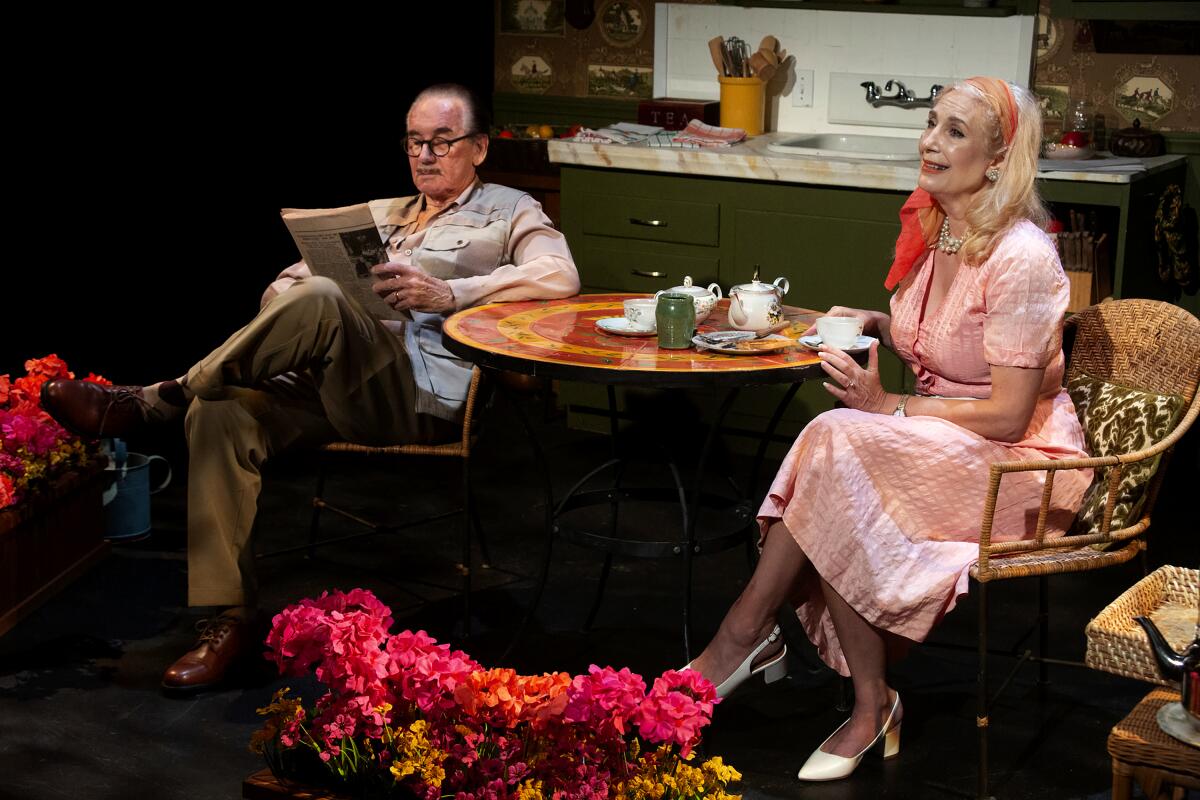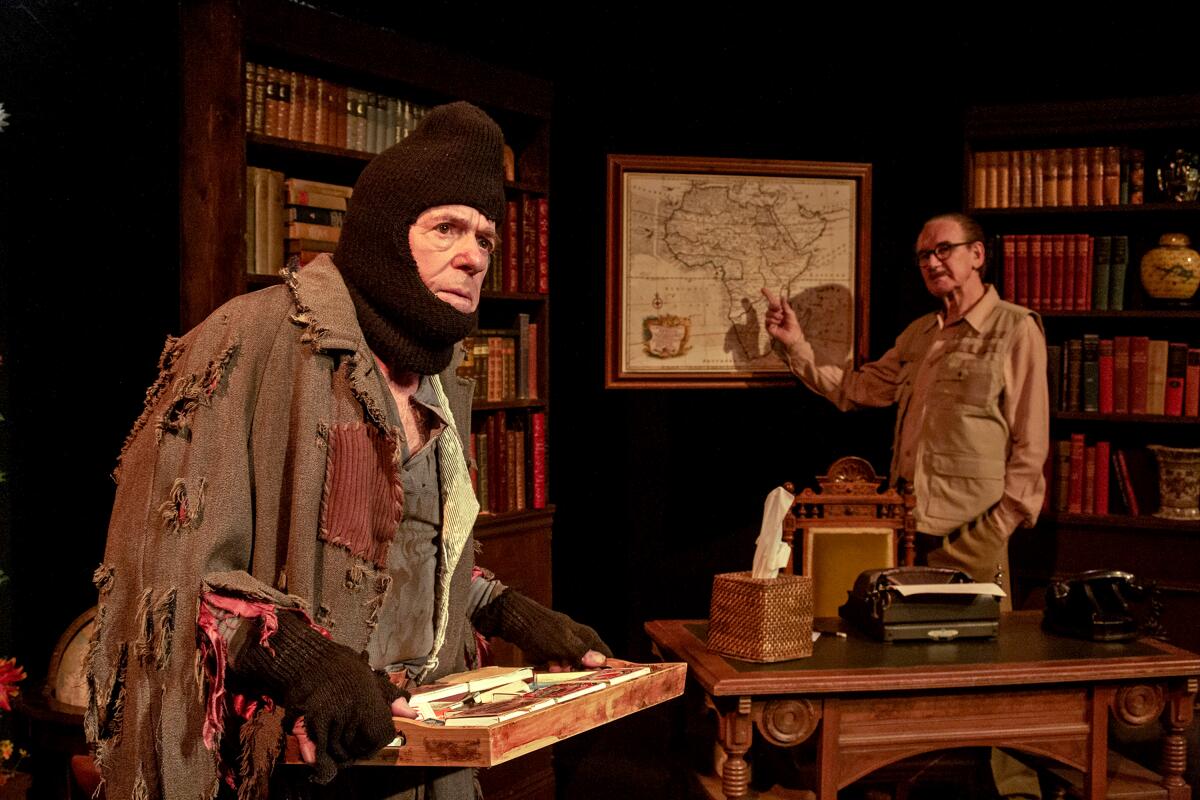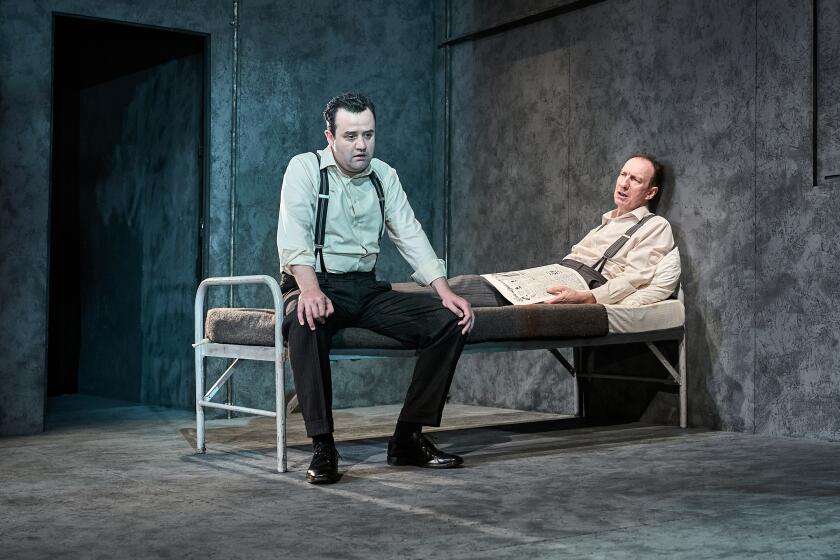Review: Necessary verbal ruthlessness is in short supply in this rare Harold Pinter revival

Few playwrights of the modern era have captured the paradox of human nature with as unsentimental an eye as Harold Pinter, who depicted in curiously menacing comedies the precarious balance between civility and savagery that marks our species.
âA Slight Ache,â his 1959 short play that was originally conceived for radio, is rarely seen in these parts. Iâm not sure if Iâve ever attended a professional production in all my years of tracking the work of this cunning British dramatist, who, in the words of fellow playwright David Hare, âcleaned the gutters of the English language, so that it ever afterwards flowed more easily and more cleanly.â
That was all the incentive I needed to check out the visiting production at the Odyssey Theatre. This tightly constructed three-character play follows the Nobel Prize-winning playwrightâs characteristic method of introducing a stranger to a domestic situation that quickly unravels as territorial instincts are unleashed to an extent that seems wildly disproportionate to the banality of the threat.
David Thewlis and Daniel Mays lead the Old Vicâs âThe Dumb Waiter,â which lampoons blind faith in authoritarian power.
What distinguishes âA Slight Acheâ from âThe Room,â The Birthday Partyâ and âThe Dumb Waiterâ â three plays from the same early period â is that itâs the bourgeoisie, not the proletariat, under mounting inexplicable pressure. The home is an affluent one, with a flourishing garden, a pool and a back gate.
The occupants of this gracious country home, Flora (Susan Priver) and Edward (Henry Olek), are a long-married couple. The state of their relationship can be discerned in the way they interact over breakfast in the garden. He reads the newspaper defensively while she noisily stirs her tea and scrapes her toast.
Flora asks if Edward has noticed the honeysuckle. The question startles him. He assumed the flower was called something else. Words matter in Pinter â nouns, especially. They lay claim to tangible reality. Whoever names, controls. No wonder conversation is such a violent sport in his plays.
The arrival of a wasp at the table foreshadows whatâs to come. Flora, in a state of panic, begs Edward to deal with the matter. He traps the creature in a pot of marmalade and takes perverse pleasure in inflicting a slow, painful death.
The English dramatistâs original style changed the face of 20th century theater. As he wrote about oppression and censorship for the stage, he also lobbied for justice as a political activist.
His manhood temporarily restored, Edward suffers an immediate setback when his wife notices him clenching his eyes. He begrudgingly acknowledges a slight ache in them. Her solicitude offends him. In Pinter, troubled vision is often associated with impotence and diminished vitality. Flora grows more forlorn with her husbandâs every crotchety reply.
The appearance of a disheveled stranger at the coupleâs back gate selling matches gives Edward a target for his ire. This elderly man, who has been standing outside Edward and Floraâs home holding a tray of matches in a nearly deserted lane, can only be up to no good in Edwardâs estimation. He demands that Flora usher the Match Seller (Shelly Kurtz) into his study for an interrogation that heâll try to palm off as a friendly colloquy.
Edward fancies himself intellectual. He writes âtheological and philosophicalâ essays â his current subject is âspace and timeâ â though Africa has been a lifelong interest. A colonialist at heart, he is only truly at peace when subjugating, collecting and filing away. Conquering the Match Seller, who doesnât speak a word throughout the play, becomes Edwardâs chief obsession.

Pinter lets the situation accelerate along these lines, dramatizing the way both Edward and Flora project onto this hapless stranger all their fears and desires. The Match Seller becomes the battleground upon which they go to marital war. The boundary between realism and symbolism blurs until it dissolves almost completely.
Directed by Jack Heller, this revival of âA Slight Acheâ â a Dance on Productions offering (produced in association with Linda Toliver and Gary Guidinger) â relies too heavily on scenic illustration. In Pinter, the dialogue should do the heavy lifting. Priver and Olek lack the necessary verbal ruthlessness that Pinterâs work demands. Accents are vague, and lines are garbled and weakly deployed.
Jeff G. Rackâs attractively furnished scenic design bears too much responsibility for summoning a milieu that should largely be conjured in chat. The characterizations of Flora and Edward are established more from Michael Mullenâs striking costumes than from the way they converse.
Priver, who has excelled in Tennessee Williams plays at the Odyssey Theatre, starring in Michael Arabianâs revival of âKingdom of Earthâ and Hellerâs production of âA Streetcar Named Desire,â commands the role of Flora once the sexual madness is turned up and the sex-starved wife lavishes her libidinous attention on the Match Seller. But itâs Kurtz in the silent role of the trembling outsider who delivers the productionâs most eloquent performance.
His eyes ablaze with fear, his reflexes conditioned for the next blow, this Match Seller clarifies (as the radio play version has difficulty doing) that the character isnât merely a figment of the coupleâs imagination. He is flesh and blood, sad, downtrodden vulnerability personified. In Pinterâs war of words, he is yet another noun that cannot be trusted â but defining him will be a costly business.
âA Slight Acheâ
Where: Odyssey Theatre, 2055 S. Sepulveda Blvd., L.A.
When: 8 p.m. Thursdays-Saturdays, 2 p.m. Sundays. Ends Oct 1
Tickets: $20-$40
Contact: OdysseyTheatre.com or (310) 477-2055 ext. 2
Running time: 1 hour, 15 minutes (no intermission)
More to Read
The biggest entertainment stories
Get our big stories about Hollywood, film, television, music, arts, culture and more right in your inbox as soon as they publish.
You may occasionally receive promotional content from the Los Angeles Times.













